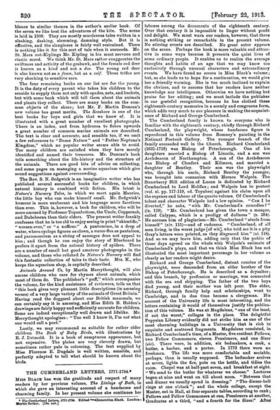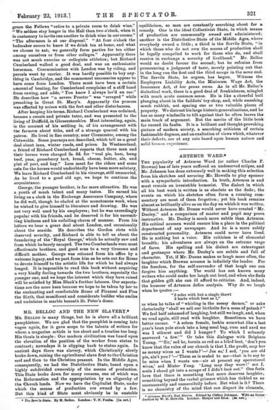THE CUMBERLAND LETTERS, 1771-1784.*
Miss BLACK has won the gratitude and respect of many readers by her previous volume, The Linleys of Bath, in which she gave an interesting account of a handsome and charming family. In her present volume she continues her • The Cumberland Letters, 1771-173[. Editec”.■•Clementina Black. London s Martin Seeker. 116e. net.]
labours among the documents of the eighteenth century. Over that century it is impossible to linger without profit and delight. We must warn our readers, however, that there is nothing striking or remarkable in the present volume. No stirring events are described. No great actor appears on the scene. Perhaps the book is more valuable and attrac- tive in some ways because it presents the quiet lives of some ordinary people. It enables ns to realize the average thoughts and habits cf an age that we may know too exclusively through unusual characters and extraordinary events. We have found no errors in Miss Black's volume ; but, as she leads us to hope for a continuation, we would give her a friendly warning. She is too much inclined to explain the obvious, and to assume that her readers have neither knowledge nor intelligence. Otherwise we have nothing but praise for her editing ; and we must include the publisher in our grateful recognition, because he has clothed these eighteenth-century memories in a seemly and congruous form, which adds very much to our pleasure in making the acquaint- ance of Richard and George Cumberland.
The Cumberland family is known to everyone who is familiar with the eighteenth century, chiefly through Richard Cumberland, the playwright, whose handsome figure is reproduced in this volume from Romney's painting in the National Portrait Gallery. The younger branch of the family succeeded well in the Church. Richard Cumberland (1631-1718) was Bishop of Peterborough. One of his daughters married a Bishop of Lincoln, and a son was Archdeacon of Northampton. A son of the Archdeacon was Bishop of Clonfert and Kilmore, and married a daughter of Bentley. Their son was the playwright who, through his uncle, Richard Bentley the younger, was brought into connexion with Horace Walpole. The Strawberry Hill edition of Lucan is dedicated by Richard Cumberland to Lord Halifax ; and Walpole has to protest (vol. xi. pp. 117-119, ed. Toynbee) against his claim upon all the expense and labour of the quarto volume. Of Cumberland's talent and character Walpole had a low opinion. " Can I be diverted," he asks, " with Mr. Cumberland's comedies ? " (ix. 128). "Mr. Cumberland has given the town a masque, called Calypso, which is a prodigy of dullness" (x. 394). He accuses him of plagiarism—Mr. Cumberland " steals from himself" (xiv. 115)—and of rudeness. "Cumberland, of all men living, is the worst judge [of wit], who told me it is a pity Gray's letters were printed, as they disgraced him " (xi. 118). And so we may leave him, adding only that the public of those days agreed on the whole with Walpole's estimate of Cumberland's plays, and that we think Miss Black has not illustrated the most important personage in her volume as clearly as her readers might desire.
Richard and George Cumberland, distant cousins of the playwright, were descended from an elder brother of the Bishop of Peterborough. He is described as a drysalter ; and this branch, by profession or marriage, was connected with the sea and shipping. The father of the two boys died young, and their mother was left poor. The elder, Richard, through family help and scholarships, went to Cambridge, and in due time became a clergyman. His account of the University life is most interesting, and the letters containing it would of themselves justify the publica- tion of this volume. He was at Magdalene, " one of the least, if not the worst," colleges in the place. The delightful Pepysian Library evidently did not strike him as one of the most charming buildings in a University that is rich in exquisite and scattered fragments. Magdalene consisted, in Richard Cumberland's time, of a Master, five resident Fellows, two Fellow Commoners, eleven Pensioners, and one Sizer (sic). There were, in addition, six bedmakers, a cook, a butler, a barber, and a porter. In 1773 there were no freshmen. The life was more comfortable and sociable, perhaps, than is usually supposed. The bedmaker arrives at seven, lights the fire, puts on the kettle, and tidies the room. Chapel was at half-past seven, and breakfast at eight. " We send to the butler for whatever we choose." Lectures began at nine and went on till about noon. "Between that and dinner we usually spend in dressing." ." The dinner-bell rings at one o'clock "; and the whole college, except the Master, eat in Hall, at four separate tables, according to rank ; Fellows and Fellow Commoners at one, Pensioners at another, Graduates at a third, "and a fourth for the Sizer." After -grace the Fellows "retire to a private room to drink wine." -"We seldom stay longer in the Hall than two o'clock, when it is customary to invite one another to drink wine in our rooms." "The afternoon is at our disposal." "At four o'clock the bedmaker comes to know if we drink tea at home, and what we choose to eat; we generally form parties for tea either among ourselves or from other colleges." Apparently there was not much exercise or collegiate athletics; but Richard Cumberland walked a good deal, and was an enthusiastic horseman. Communication with London was by riding, and parcels went by carrier. It was hardly possible to buy any- thing in Cambridge, and the commonest necessaries appear to have come from London. There must have been a certain amount of boating, for Cumberland complains of a stiff hand from rowing, and adds, " You know I always lov'd an oar." He describes how " a severe Procter " was " scraped " while preaching in Great St. Mary's. Apparently the process was effected by noises with the feet and other disturbances.
After keeping his terms, Richari Cumberland was ordained, became a curate and private tutor, and was presented to the living of Driffield, in Gloucestershire. Most interesting, again, is- the account of his settling in, of his arrangement with the farmers about tithe, and of a strange quarrel with his patron. He lived in fine country, near Cirencester, among the Cotswolds. Some journeys are described, which tell us a great deal about inns, winter roads, and prices. In Westmorland, a friend of Richard Cumberland reports that three men and their horses were charged 3s. 6d. for "veal pie, ham, hung beef, peas, gooseberry tart, bread, cheese, butter, ale, and pint of port, and hay." Less meat for the riders and some oats for the horses would undoubtedly have been more salutary. We leave Richard Cumberland in his vicarage, still unmarried. As he lived to a good old age, we hope to continue the acquaintance.
George, the younger brother, is far more attractive. He was a youth of much talent and many tastes. He earned his living as a clerk in the Exchange Assurance Company, where he did well, though he chafed at the monotonous work, when he wished to give himself to literature and drawing. He was not very well used by his employers ; but he was exceedingly popular with his friends, and he deserved it for his unremit- ting kindness and his unfailing charm of manner. From his letters we bear a great deal about London, and occasionally about the seaside. He describes the Gordon riots with deserved severity, and Richard is able to tell us about the foundering of the Royal George,' which be actually saw and from which he barely escaped. The two Cumberlands were most affectionate brothers, and good sons to a very tiresome and difficult mother. George was released from his office by a welcome legacy, and we part from him as be sets out for Rome to devote himself to the artistic life for which he bad always longed. It is impossible to read this book without acquiring a very kindly feeling towards the two brothers, especially the younger one, and we hope the interest which they have raised will be satisfied by Miss Black's further labours. Our expecta- tions are the more keen because we hope to be taken by her to the enchanting and comfortable Rome of Piranesi and Pius the Sixth, that munificent and considerate builder who smiles and undulates in marble beneath St. Peter's dome.















































 Previous page
Previous page